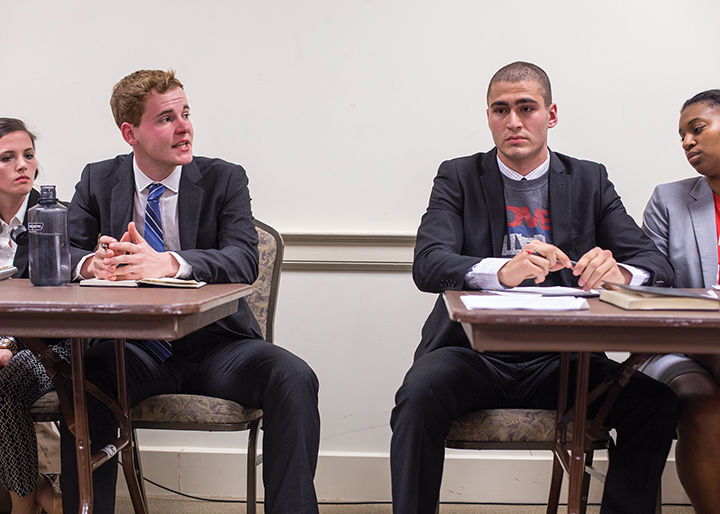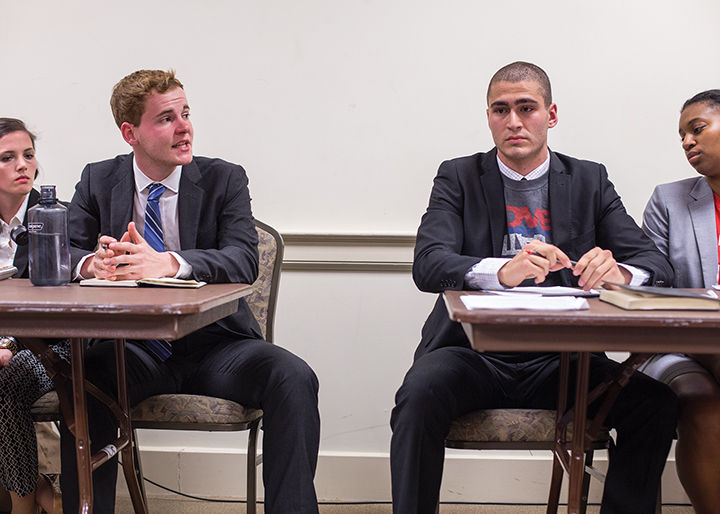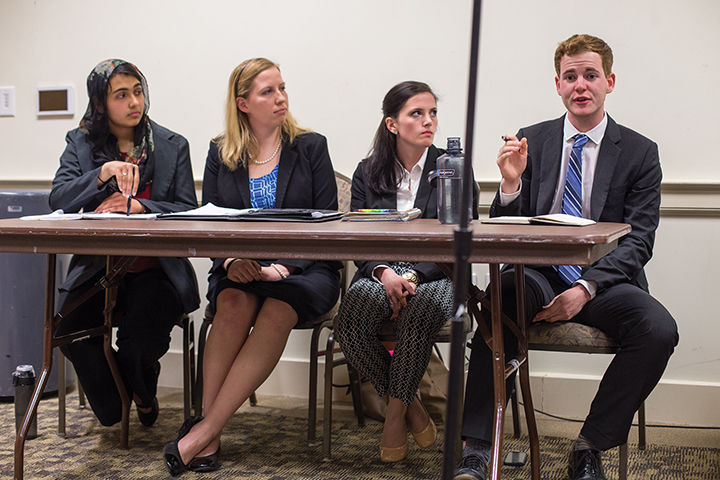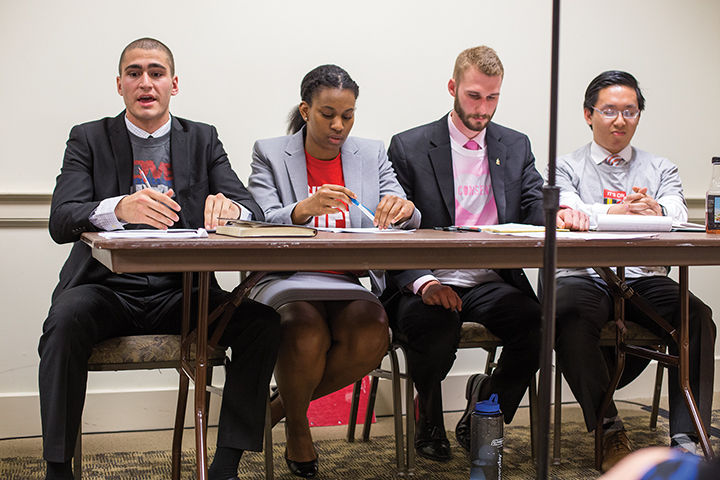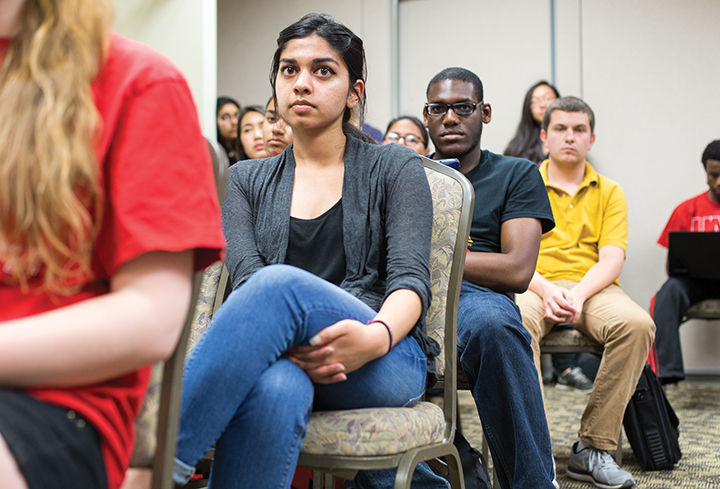Incumbent SGA President Patrick Ronk and presidential candidate Ori Gutin went head to head last night at the executive candidate debate in Stamp Student Union before a crowd of about 70 attendees.
The two Student Government Association presidential candidates — Ronk representing the Next Party and Gutin the Voice Party — debated topics such as diversity, student-administrator relations, sexual assault and student parking on the campus. The candidates are on the 2015-16 academic year ballot, which will be open for voting from April 22 to 24.
In his opening statement, Ronk said his experience as SGA president shows his ability to lead the student body, as do the SGA’s accomplishments this year, such as the state’s passing of an intern protection bill, the push for the sale of alcohol at athletic events, lobbying in Annapolis for lower tuition, creating the Police Chief’s Advisory Board and working with Cole Field House-based student groups facing displacement.
“This year we’ve done a fantastic job of advocating for students and getting them real results,” Ronk said. “[With alcohol at athletic events] students will binge drink less, and money for that will go to mental health services, diversity trainings and alcohol education — up to $500,000 a year.”
Gutin countered that even though the SGA is passing legislation in favor of students, there is weak direct communication between the SGA and students it represents. He said this concern prompted him to run for president.
“In the past year that I’ve been in the SGA, I’ve seen a fundamental disconnect between students and the student government,” said Gutin, who is currently SGA’s sustainability director. “We’re meant to advocate for students and yet we make no effort to connect with the student body. I want to see an SGA that cares just as much about building relationships with students as it does with administrators.”
Ronk said the SGA’s quick response to student needs on the campus, such as passing a bill in support of changing the name of Byrd Stadium and developing a proposal for Student Code of Conduct changes, proves the SGA is listening and responding to the student body and their concerns.
While Ronk and Gutin’s debate revealed they share similar goals — increasing diversity and inclusion on the campus, increasing student access to the SGA and university administrators, creating more social opportunities for commuters — they often heatedly disagreed on what’s been done and what needs to be done.
To help with student outreach, Gutin said the Voice Party plans to conduct an in-depth interview with at least one constituent a week about concerns as well as host central office hours every other week on areas of campus readily accessible to students.
Ronk, on the other hand, said creating an online rather than physical forum to handle student concerns and connect students with the proper administrators is more efficient.
The two also starkly disagreed on the matter of student parking on the campus, as campus resident parking is slated to be eliminated by 2017.
Gutin said the student body should turn their focus toward supporting the Purple Line, increasing bike accessibility and asking the Department of Transportation Services to bring the 104 Metro bus to South Campus.
“[Eliminated parking] goes along with our long term strategic housing plan that shows development all across the campus for new residential buildings and academic buildings,” Gutin said. “We need to embrace the change rather than fight it.”
Ronk insisted student parking on the campus, especially for juniors and seniors, is a need and not an option.
“I have an internship in Annapolis this summer, and I wouldn’t be able to go if I didn’t have a car,” Ronk said. “We need to make sure at the very least juniors and seniors in Commons, in Courtyards, and in other apartments can park on campus, just so they can go grocery shopping and other things like that.”
After the candidates for vice president of academic affairs, vice president of financial affairs and vice president of student affairs had the chance to debate as well, both parties presented their platforms and agendas.
The Voice Party’s platform outlines goals for the coming academic year — increased presence in Annapolis, more open-source textbooks, increased funding for multicultural organizations, in-person sexual assault prevention training, heightened SGA transparency — but noted it doesn’t intend to finalize plans without further talks with constituents.
“As a party, we are really trying to connect with students more, and connect the student body with the student government rather than making the student body come to [them],” said SGA member and freshman government and politics major Cassidy Chassagne, who is running for behavioral and social sciences college representative.
The Next Party’s platform includes internal transparency, a new bereavement policy, expanding on-campus tailgating, raising the student activities fee to fund student groups and making the university more accessible for disabled students and preventing College Park from taking away more student rental housing.
The platform is structured and will get students tangible results, said Charmaine Wilson-Jones, the SGA’s vice president of academic affairs.
“In past elections, people have promised outlandish things just to get votes,” Wilson-Jones said. “Our platform is specific, it’s actionable, and it’s student-driven — it’s in response to student concerns.”
Ronk said the ultimate goal is to make the most change in the short time students have at the university.
“If you want something from administrators, they can wait you out; they have 40 years,” Ronk said. “We’re not going to get you the moon, but we’re going to get you a few stars in there.”
SGA presidential candidates Patrick Ronk (left) and Ori Gutin (right) speak at the SGA presidential debate
Next Party candidates Shabnam Ahmed, Sarah Niezelski, Katherine Swanson, and Patrick Ronk speak at the SGA presidential debate in the Benjamin Banneker room of Stamp on Thursday, April 16.
Voice Party candidates Ori Gutin, Corinne Paul, J.T. Stanley, and Justin Lee spoke at the SGA presidential debate in the Benjamin Banneker room of Stamp on Thursday, April 16.
Students watching the SGA presidential debate in the Benjamin Banneker room of Stamp on Thursday, April 16.
